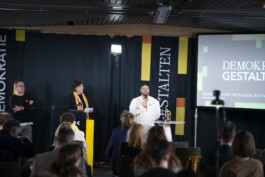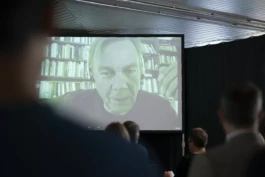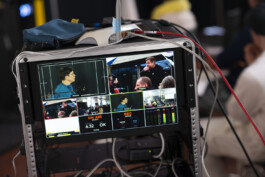How do you design democracy? By living it. The DDC summoned the design experts over two days at the end of March for its convention for democratic design.
You can find the german review here: https://www.ddc.de/de/magazin/review-ddc-konvent.php
The aesthetic, ecological, economic, and political role of design in and for democracy was discussed intensively by university rectors, professors, agency owners, designers, and students from various design disciplines. The many different perspectives not only proved to be a challenge, but also the decisive basis for the productive outcome of the convention. It became clear to all participants that the format, a space for joint, productive debate, was a value in itself.

The two concentrated workshop days in the Frankfurt Atelier Lihotzky began with a welcome from the DDC team Felix Kosok, Elisabeth Budde, Rolf Mehnert and introductory words from Karin Wolff, the managing director of the Kulturfonds Frankfurt RheinMain, followed by a condensed program of keynote speeches. Matthias Wagner K, head of the Frankfurt RheinMain region's application for the title "World Design Capital 2026" under the motto "Design for Democracy. Atmospheres for a better life”. The responsibility of designers for the consequences of their own design was a common thread from the beginning of the convention, which Wagner K explained in his lecture. A thread that sociologist Harald Welzer picked up directly and also posed the question of whether design can be democratic at all and whether it shouldn't rather be about using design for democratic purposes. Ultimately, this means redesigning society for sustainability. Uli Mayer-Johanssen combined this demand with a vision and the appeal of design that designers need to be aware of in the face of the great challenges of our time. And finally, Boris Kochan, President of the German Design Day, called on the designers to become more politically involved without failing to point out the grueling effects of the political apparatus.

The second lecture panel on the challenges of democracy was opened by the design scientist Bianca Herlo from the Design Research Lab with a look at the designed exclusion mechanisms of digital participation tools, which one has to be aware of if you want to actively participate in democratic processes digitally. Dominik Herold from the mehr als wählen association reflected on the nature of radical democracy in order to then combine these theories with his practical work in the citizens' council of his association, the Democracy Convention. How to address people who think they are far from politics and real participation is a central challenge for our democracies. The situation is similarly challenging with people in so-called filter bubbles on the right-wing edge of society, which Katja Böhne from the Bildungsstätte Anne Frank reported on. Communication through design can also play a central role in breaking through these filter bubbles. In the concluding impulse, Michael Volkmer reported on the process of applying for the title "World Design Capital 2026" and presented an inspiring roadmap of questions, topics, challenges and first project examples.


The second day began as the first had ended: with discussion and productive engagement. Before going back to the individual workshop groups, the past day was discussed in plenary. However, the goal was clear: the final presentation in front of the invited podium from culture, science and politics. However, the intensive talks had paid off. Each workshop group presented an individual result, which represented a summary of concrete ideas, demands, criteria, networks and the call for self-reflection of design. The panellists had much material to react to and to discuss. Two members of the Bundestag, Armand Zorn from the SPD and Deborah Düring from the Greens, the political scientist and head of the Hessian Foundation for Peace and Conflict Research, Nicole Deitelhoff, and Meron Mendel, the director of the Anne Frank educational institution, were pleasantly surprised by the density of the Results.
The podium was accompanied by moderator Kristina Oldenburg and the two DDC board members, Bettina Knoth and Felix Kosok. The central questions of the two days were discussed again and it was also critically assessed to what extent design and especially designers would be entitled to optimize and shape democratic processes and institutions without a political mandate. Finally, the two young politicians again formulated a demand for the design discipline to get involved politically in order to be able to represent these important concerns. Nicole Deitelhoff and Meron Mendel emphasized how important it is to formulate a clear message and attitude when communicating with politicians. In particular, however, the discussion once again made it clear how important the exchange and debate within the design discipline about responsibility and attitude and about the role of design in democracy was, made possible by the support of the Kulturfonds FRM and the City of Frankfurt. It will not be the last of these formats that the DDC will host in 2022, which it has set under the motto "Design for Democracy". That much is certain.